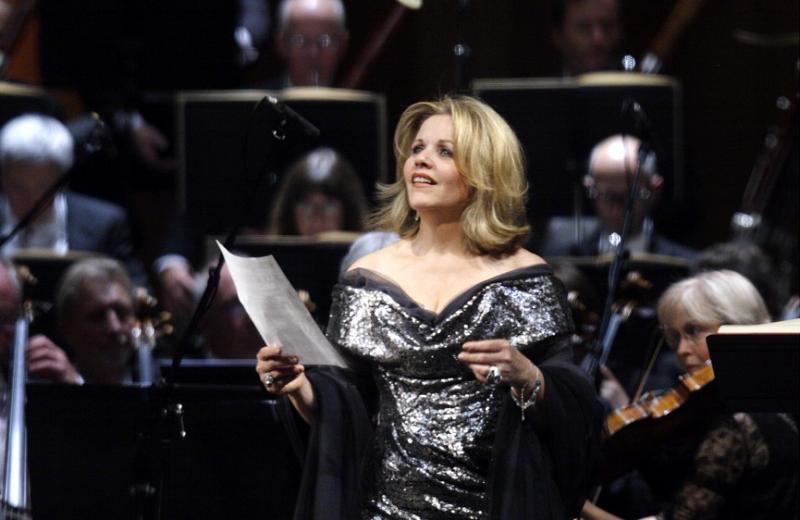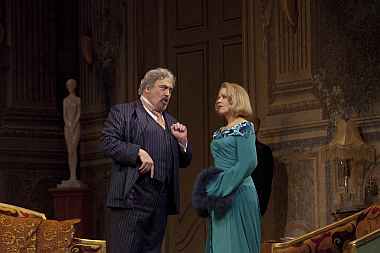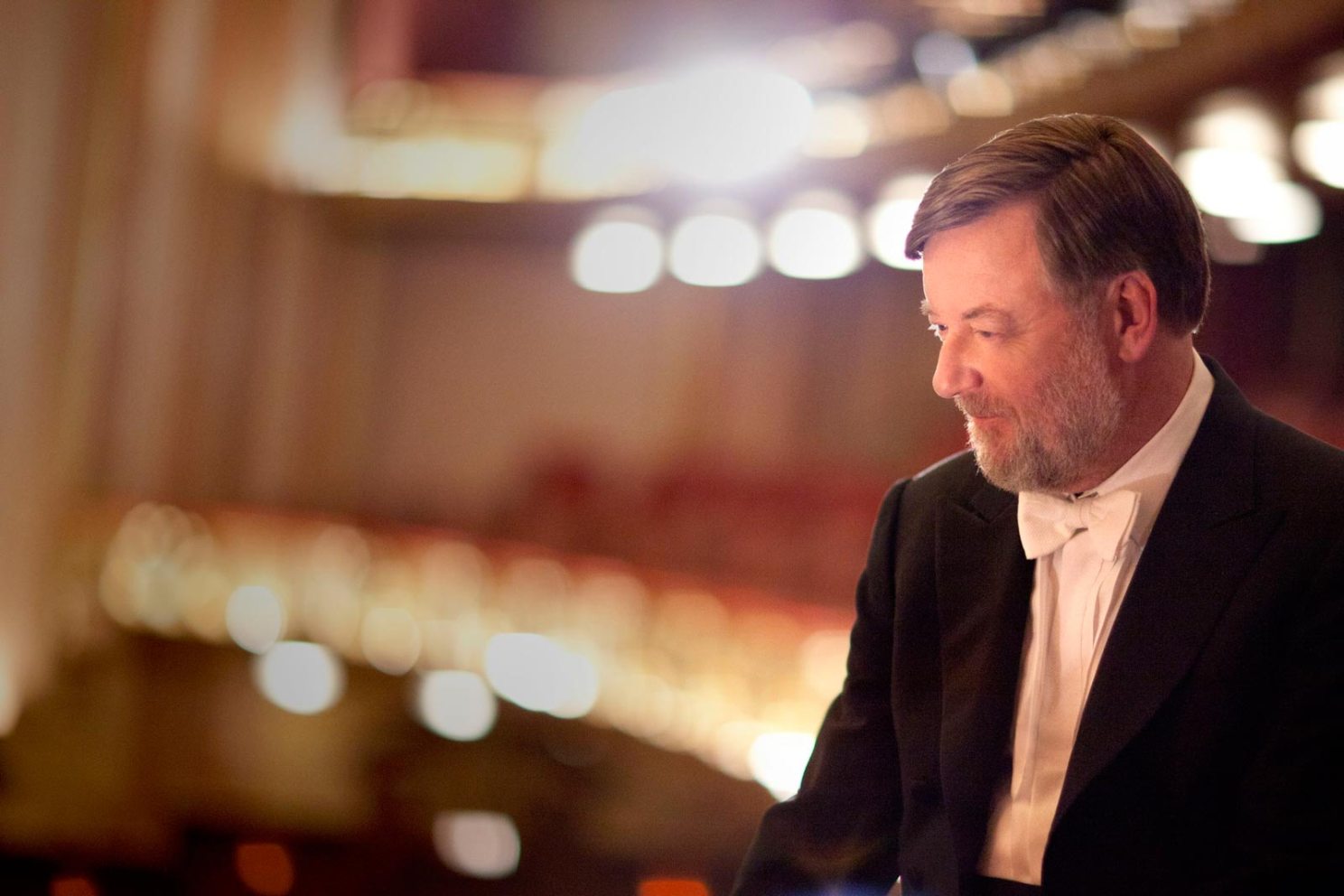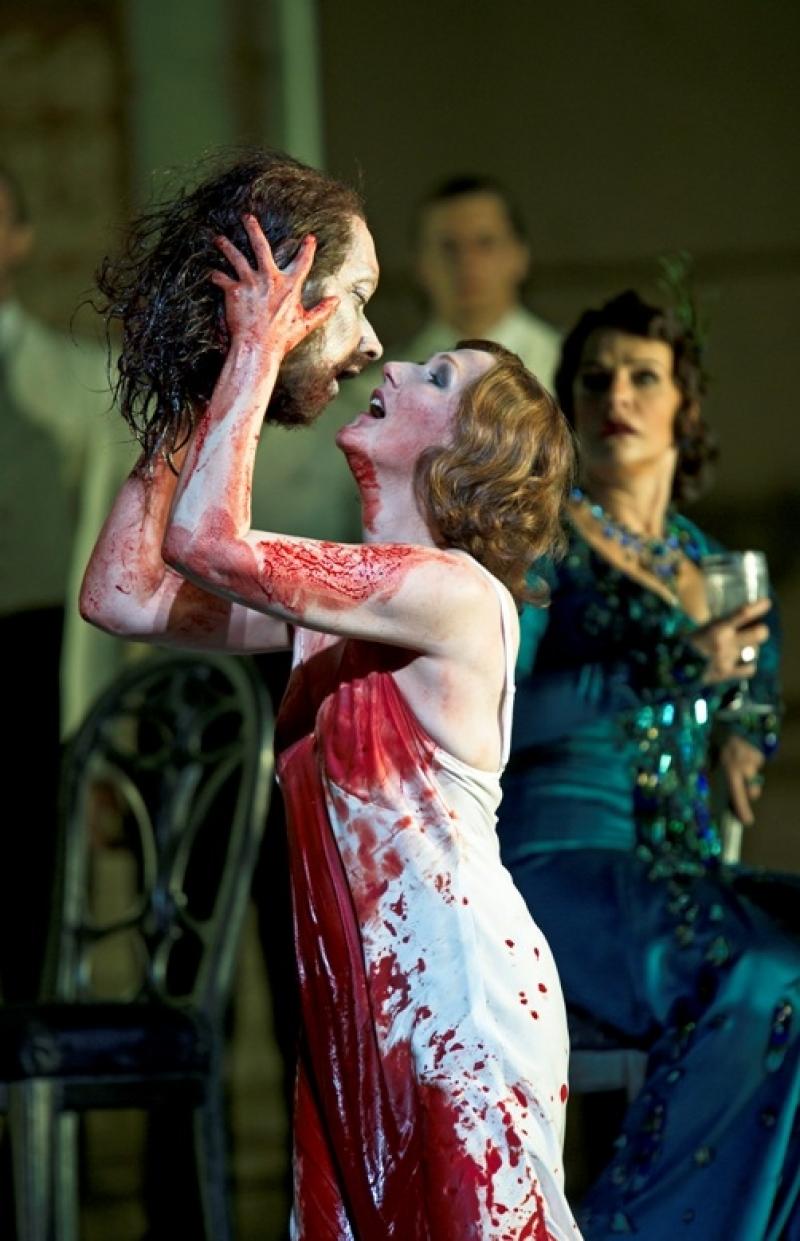Capriccio, Royal Opera | reviews, news & interviews
Capriccio, Royal Opera
Capriccio, Royal Opera
A superlative cast works at different levels in this concert performance of Strauss's operatic debate

Richard Strauss’s lavish postscript to 50 years of music theatre is about so much more than the theme of its source, Salieri’s Prima la musica e poi le parole ("first the music and then the words", with a big invisible question mark). Its overall subject of rival claims in opera also embraces spoken drama, poetry, dance and specific bel canto, all of them marshalled by the most experienced of theatre directors.
There were two seasoned professionals, Fleming as muse of opera the Countess Madeleine and Peter Rose as the Max Reinhardt of an anachronistic 18th century Parisian salon, trading deliciously on their stage experience (pictured below in the Met production) and a third, Bo Skovhus as the Countess’s musically illiterate brother, going over the top with a relish we couldn’t always share as he relived his. There were two newcomers stepping into distinguished shoes, tenor Andrew Staples’s ardent composer Flamand as a replacement for the lovely Joseph Kaiser and the beautiful, opulent-voiced mezzo Tanja Ariane Baumgartner filling the gap left by much-missed Christine Rice in the role of the great actress Clairon; both are destined to be the best exponents of their roles but remain as yet a little tied to the score of this demandingly conversational one-off. Christian Gerhaher was valiantly back on stage after a back operation as saturnine poet Olivier, colouring every word but inevitably constricted to a chair for the most part.
 Holding to the opera’s tenet that "the magic of music solves every problem"– a line lost, along with Straussian self-quotation, in this performance’s least explicable small cut - conductor Andrew Davis kept it all on the move, a little too much so in the opening string sextet, not spacious enough to let co-concert master Sergey Levitin and his Royal Opera Orchestra colleagues properly inhabit their elaborate neoclassical phrases. But once the orchestrally jewel-studded musical conversation was on the boil, Davis missed no trick in Strauss’s illuminated manuscript of a score. Soulful interludes had all the quiet glow they needed, if not a climactic sensuousness, and the placing of the three delicate chords around the final horn calls at magical curtain-down formed a last symbol of his perfectionism.
Holding to the opera’s tenet that "the magic of music solves every problem"– a line lost, along with Straussian self-quotation, in this performance’s least explicable small cut - conductor Andrew Davis kept it all on the move, a little too much so in the opening string sextet, not spacious enough to let co-concert master Sergey Levitin and his Royal Opera Orchestra colleagues properly inhabit their elaborate neoclassical phrases. But once the orchestrally jewel-studded musical conversation was on the boil, Davis missed no trick in Strauss’s illuminated manuscript of a score. Soulful interludes had all the quiet glow they needed, if not a climactic sensuousness, and the placing of the three delicate chords around the final horn calls at magical curtain-down formed a last symbol of his perfectionism.
The discussion will never be to everyone’s taste; I could sense very different levels of enjoyment around me, not least from a neighbour who fiddled with her press release and a chattering couple who left just before the entertainment that might have delighted them. That's the duet of a Neapolitan tenor and soprano, hilariously over the top in the hands of golden-voiced Barry Banks and Mary Plazas, friends reunited some years after their perfect partnership in the English National Opera production of Donizetti’s L’elisir d’amore.
 Davis’s pace (the conductor pictured left) and the singers’ lively intelligence brought home how Strauss, like Wagner before him, introduces new ideas and changes of register every 10 or so minutes. This may be the non-plot famously described as "after 45 minutes, chocolate is served", but it has its high spots, and they were all as near perfect as Strauss’s demands would allow. There was composer Flamand’s cool but beautiful setting of Olivier’s sonnet – actually by Ronsard – where Staples ignited an ardour more fully unleashed in his love scene with the Countess. There were the “what is opera” fugue crisply kicked off by Gerhaher and two brilliant octets culminating in director La Roche’s baby-egotistical plea to write him an opera that touches the soul. Strauss sets it in a cruelly high register for his bass-buffo, and at a couple of points you could sense the strain for Rose after so much authoritative delivery, but there’s still no other bass around who could handle the wittily-despatched German setting so crisply or meaningfully.
Davis’s pace (the conductor pictured left) and the singers’ lively intelligence brought home how Strauss, like Wagner before him, introduces new ideas and changes of register every 10 or so minutes. This may be the non-plot famously described as "after 45 minutes, chocolate is served", but it has its high spots, and they were all as near perfect as Strauss’s demands would allow. There was composer Flamand’s cool but beautiful setting of Olivier’s sonnet – actually by Ronsard – where Staples ignited an ardour more fully unleashed in his love scene with the Countess. There were the “what is opera” fugue crisply kicked off by Gerhaher and two brilliant octets culminating in director La Roche’s baby-egotistical plea to write him an opera that touches the soul. Strauss sets it in a cruelly high register for his bass-buffo, and at a couple of points you could sense the strain for Rose after so much authoritative delivery, but there’s still no other bass around who could handle the wittily-despatched German setting so crisply or meaningfully.
You had to love the little vignette-intermezzo for servants – five out of the eight fine young singers on the Royal Opera’s Jette Parker Young Artists Programme – and the weird twilight scene for king of the underground Monsieur Taupe the prompt, a gem of solipsistic characterization from Graham Clark. But ultimately Strauss clears the stage for his soprano and a last gran scena where, although we can’t really care about her erotic dilemma of choosing between poet and composer, the orchestra and the generous vocal line once again triumph.
Fleming, having sparkled with immaculate good graces and relaxed body language throughout the chatter, soared as only she can. Once or twice the voice wouldn’t quite do what she wanted it to – I was lucky enough to witness sheer perfection a couple of days earlier – but there was plenty of engagement and awe-inspiring breath control to admire. It is at the end, said Strauss, that a composer can achieve his finest results. He did so at the age of 78, retreating to his musical world-within-world from the barbarism around him, and he’s very lucky indeed to have such interpreters around today to plead his special case.
MORE RICHARD STRAUSS ON THEARTSDESK
Der Rosenkavalier, Royal Opera (2009). Uneven revival of John Schlesinger’s 25-year-old production
Capriccio, Grange Park Opera (2010). Lively staging, stylish singing and a welcome intrusion of wartime reality
Salome, Royal Opera (2010). Angela Denoke's mercurial Salome (pictured below by Clive Barda) shimmers in Strauss's monstrously beautiful opera
Ariadne auf Naxos, Welsh National Opera (2010). Hoffmansthal's libretto is all about fidelity. This updating is faithful, up to a point
 Intermezzo, Scottish Opera (2011). Soprano Anita Bader graces a Klimtian take on Richard Strauss's domestic comedy
Intermezzo, Scottish Opera (2011). Soprano Anita Bader graces a Klimtian take on Richard Strauss's domestic comedy
Die Frau ohne Schatten, Mariinsky Opera (2011). Strauss's massive fairy tale makes a rare outing in Gergiev’s musically strong venture at the Edinburgh Festival
Der Rosenkavalier, English National Opera (2012). David McVicar and Edward Gardner deliver a riveting account of Strauss's popular opera with Amanda Roocroft as the Marschallin
Intermezzo, Buxton Festival (2012). Fine style in Strauss's comedy-with-feeling
Ariadne auf Naxos, Glyndebourne Festival Opera (2013). Strauss's opera reluctantly enters the Battle of Britain courtesy of a young German director
Elektra, Royal Opera (2013). Revival with Christine Goerke in the title role hits the horrid heart of the matter in Strauss's poleaxing masterpiece
Die Frau ohne Schatten, Royal Opera (2014). Compelling dream-interpretation of Strauss's myth graced by fine singing and Semyon Bychkov’s conducting
Der Rosenkavalier, Glyndebourne (2014). Richard Jones finds new order in rococo comedy for music, with Kate Royal as the Marschallin
Salome, BBC Proms (2014). Nina Stemme stuns with Donald Runnicles and the Deutsche Oper Berlin in a giddying account of Strauss's incredible score at the Proms
Ariadne auf Naxos, Royal Opera (2014). Two nymphs are the real revelation in this revival of evergreen hybrid
Salome, Symphony Hall, Birmingham (2015). Lise Lindstrom steals the show from Karabits and Bournemouth SO as a sensual Strauss anti-heroine in concert
Der Rosenkavalier, Royal Opera (2016). Robert Carsen's handsome production with Renée Fleming is elevated by superb orchestral playing
Add comment
The future of Arts Journalism
You can stop theartsdesk.com closing!
We urgently need financing to survive. Our fundraising drive has thus far raised £49,000 but we need to reach £100,000 or we will be forced to close. Please contribute here: https://gofund.me/c3f6033d
And if you can forward this information to anyone who might assist, we’d be grateful.

Subscribe to theartsdesk.com
Thank you for continuing to read our work on theartsdesk.com. For unlimited access to every article in its entirety, including our archive of more than 15,000 pieces, we're asking for £5 per month or £40 per year. We feel it's a very good deal, and hope you do too.
To take a subscription now simply click here.
And if you're looking for that extra gift for a friend or family member, why not treat them to a theartsdesk.com gift subscription?
more Opera
 Albert Herring, English National Opera review - a great comedy with depths fully realised
Britten’s delight was never made for the Coliseum, but it works on its first outing there
Albert Herring, English National Opera review - a great comedy with depths fully realised
Britten’s delight was never made for the Coliseum, but it works on its first outing there
 Carmen, English National Opera review - not quite dangerous
Hopes for Niamh O’Sullivan only partly fulfilled, though much good singing throughout
Carmen, English National Opera review - not quite dangerous
Hopes for Niamh O’Sullivan only partly fulfilled, though much good singing throughout
 Giustino, Linbury Theatre review - a stylish account of a slight opera
Gods, mortals and monsters do battle in Handel's charming drama
Giustino, Linbury Theatre review - a stylish account of a slight opera
Gods, mortals and monsters do battle in Handel's charming drama
 Susanna, Opera North review - hybrid staging of a Handel oratorio
Dance and signing complement outstanding singing in a story of virtue rewarded
Susanna, Opera North review - hybrid staging of a Handel oratorio
Dance and signing complement outstanding singing in a story of virtue rewarded
 Ariodante, Opéra Garnier, Paris review - a blast of Baroque beauty
A near-perfect night at the opera
Ariodante, Opéra Garnier, Paris review - a blast of Baroque beauty
A near-perfect night at the opera
 Cinderella/La Cenerentola, English National Opera review - the truth behind the tinsel
Appealing performances cut through hyperactive stagecraft
Cinderella/La Cenerentola, English National Opera review - the truth behind the tinsel
Appealing performances cut through hyperactive stagecraft
 Tosca, Royal Opera review - Ailyn Pérez steps in as the most vivid of divas
Jakub Hrůša’s multicoloured Puccini last night found a soprano to match
Tosca, Royal Opera review - Ailyn Pérez steps in as the most vivid of divas
Jakub Hrůša’s multicoloured Puccini last night found a soprano to match
 Tosca, Welsh National Opera review - a great company reduced to brilliance
The old warhorse made special by the basics
Tosca, Welsh National Opera review - a great company reduced to brilliance
The old warhorse made special by the basics
 BBC Proms: The Marriage of Figaro, Glyndebourne Festival review - merriment and menace
Strong Proms transfer for a robust and affecting show
BBC Proms: The Marriage of Figaro, Glyndebourne Festival review - merriment and menace
Strong Proms transfer for a robust and affecting show
 BBC Proms: Suor Angelica, LSO, Pappano review - earthly passion, heavenly grief
A Sister to remember blesses Puccini's convent tragedy
BBC Proms: Suor Angelica, LSO, Pappano review - earthly passion, heavenly grief
A Sister to remember blesses Puccini's convent tragedy
 Orpheus and Eurydice, Opera Queensland/SCO, Edinburgh International Festival 2025 review - dazzling, but distracting
Eye-popping acrobatics don’t always assist in Gluck’s quest for operatic truth
Orpheus and Eurydice, Opera Queensland/SCO, Edinburgh International Festival 2025 review - dazzling, but distracting
Eye-popping acrobatics don’t always assist in Gluck’s quest for operatic truth
 MARS, Irish National Opera review - silly space oddity with fun stretches
Cast, orchestra and production give Jennifer Walshe’s bold collage their all
MARS, Irish National Opera review - silly space oddity with fun stretches
Cast, orchestra and production give Jennifer Walshe’s bold collage their all

Comments
If David Nice is unwilling to
If David Nice is unwilling to mention the nature of his close personal relationship with Peter Rose, the subject of his flattering review, then he should hand reviewing duties over to a colleague. When reviewers report on members of their (extended) family, the results are bound to be biased.
Let me explain. No-one else
Let me explain. No-one else was available on The Arts Desk to review, and the exemplary ensemble (which is the subject of my review, not Peter Rose) needed fair representation, especially as this opera is rather too much derided by those who don't like it, and I adore it.
'Close personal relationship'/'(extended) family' is a bit much when I see Peter socially three or four times a year, if that. 'Friendship' will do, and I consulted colleagues about whether 'I know him' should be inserted into the piece. It sat gracelessly. But flattery this is not. I challenge you or any other critic to contradict the simple truths (and the one qualification) I expressed about Peter's performance - that the German is sung with exemplary style, that he knew his part better than anyone else on stage other than Renee Fleming (Bo Skovhus clearly a close third), and that the high-lying writing in the big aria is unquestionably a strain for him at that stage of the opera, nearly two hours in. Whether this is a justification or not is for others to judge.